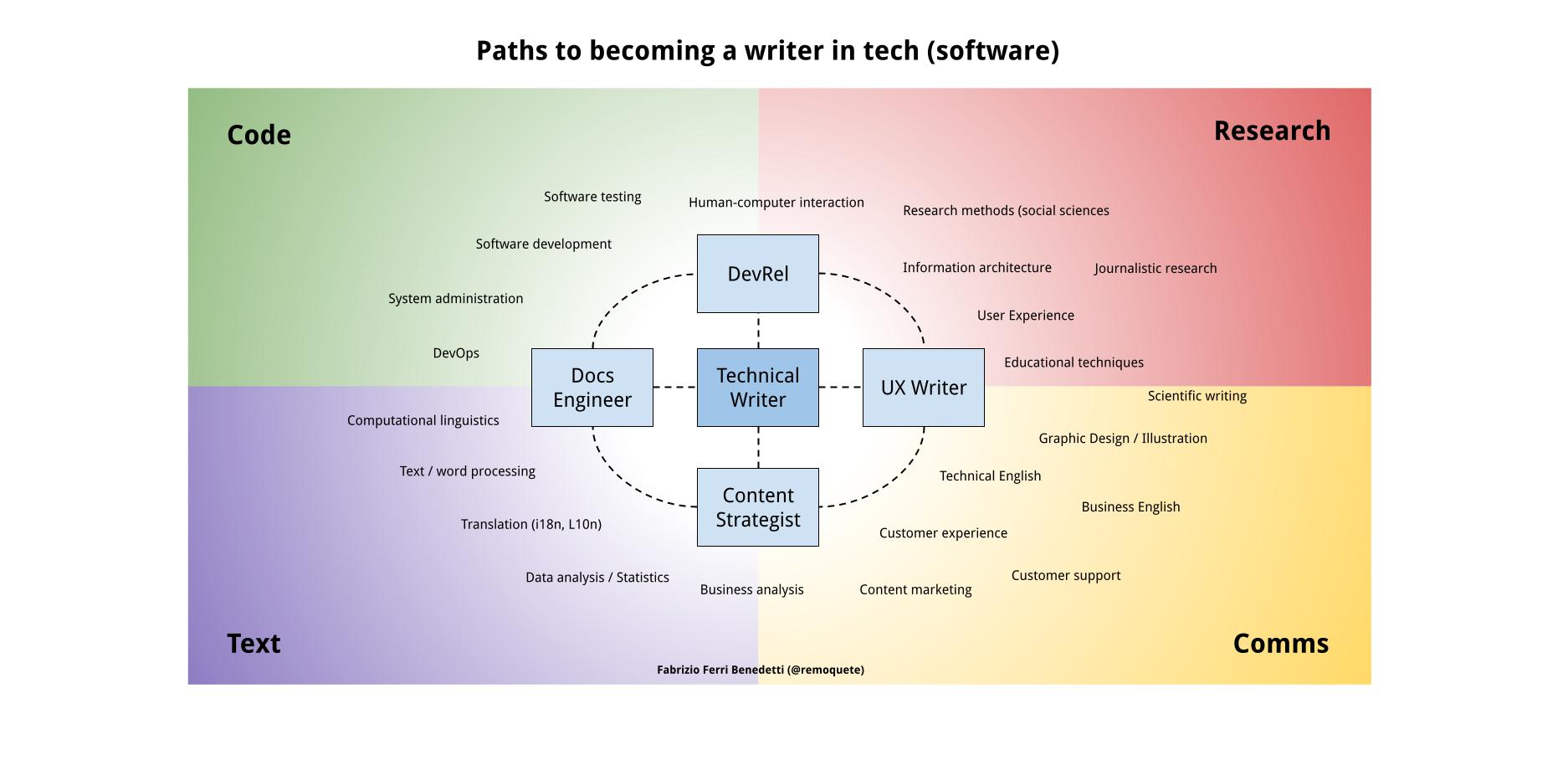Technical writing is not a dead-end job, it's a landing pad
With the job market getting tougher by the day, there’s a rising belief among tech writers that their role is “too niche” and a “dead-end job”. I think that’s the wrong way of looking at our profession — at any profession. Let me cast aside that dark veil of pessimism and offer an alternative viewpoint, that of tech writing as a platform to other professions, one that lets you move laterally with just a bit of curiosity and courage.
Tech writing is but one shore of the same big island, humanities in tech
In How to become a technical writer I used a diagram that aimed at illustrating the many paths through which one can become a technical communicator. These are possible because, as I explained in the post, composite professions such as technical writing bridge the gap between discrete crafts and bring them together through hybridization. Tech writing exists because it fills a niche, yes. That’s its strength.

Revisiting that diagram, though, I realized that there’s no mandatory direction in it: one can move either towards or away from technical writing. You can become a tech writer from a different but related background, but also drift and become a dev, a product manager, or an information architect from a technical writing position. I’ve seen it happening and even had several chances to do that kind of move in the past.
Tech writing is but one of the many shores of the island of humanities in tech. We live and work in the same space of UX writing, design, information architecture, and even developer relations (though they prefer to live on a boat moored near the bay). Tech writing, in that sense, is a landing pad, the Trojan horse that lets in folks who wouldn’t have had a chance to enter the world of software, including myself.
Tech writing isn’t going anywhere, but it might change its name soon
Tech writing is unlikely to disappear. The sector where we’ve seen the biggest growth in recent years is computing: writers have always been present in software and hardware companies since the 60s. But even in highly regulated sectors, such as aviation, manufacturing, and pharmaceutics, docs are a necessity for legal and compliance reasons. You could call those the bastions of our craft.
The pace of change in tech is increasing, though, in no small part due to the advent of large language models and an increased emphasis on automation. Better UX also means that user docs are seen as less necessary, with docs priorities shifting towards more technical products that often require development skills. “How can I transition to dev docs?”, a fellow writer asked me the other day.
In Technical writing in 2049 I imagined our profession becoming more personal and concerned with aspects such as design and product integration. Our profession might have a totally different name by then, but its essence- bridging the gap between tech and people - will be the same. It’s in your hands to craft that path wherever you are. Tools will not be all that important: our mindset will be.
Seize opportunities. Wordsmith them when they don’t exist
If you’re reading this post you might be in one of three possible scenarios:
- You’re working as a technical writer and want to change.
- You’re unemployed and looking for technical writing positions.
- You’re looking to start your career as a tech writer.
If you’re already working as a technical writer and are looking for a change, look inside your company first. Moving to lateral fields is easier when you’re working for a medium or large company. Going through a bout of impostor syndrome? Remind yourself that your job literally consists of absorbing and regurgitating information in comprehensible, structured ways, something you share with 90% of jobs in tech.
If you’re unemployed or looking for your first job with a tech writing degree fresh from the oven, don’t limit yourself to jobs that bear “technical writer” in their name. Tech comms can happen across an entire constellation of jobs. Also, companies might not always go for the classic names; sometimes they don’t even know what they need, let alone know the name for it. Opportunities often lurk in seemingly unrelated jobs.
Lastly, job titles can be self-limiting. Don’t parrot job stereotypes when applying to a job. Instead, piece the useful bits together to respond to business needs. You’re selling your skills and your journey, not a cookie-cut statement. Startups in particular don’t need those.
Need more? Read Tips for job hunting as a technical writer.